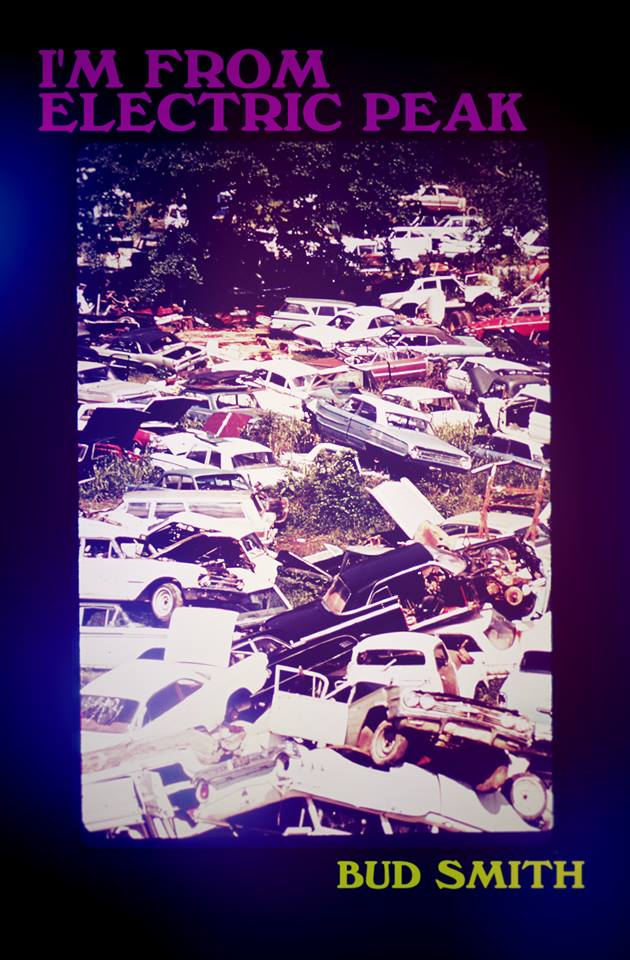 Review by Caitlin Murphy
Review by Caitlin Murphy
I love a good literary road trip. From Tolkien’s Middle Earth to Kerouac’s America, there is something undeniably appealing about them. To me, they’re a modern take on the quest narrative or coming of age story, serving as a vehicle through which characters are developed for the better, returning home wiser, stronger, and changed. When Kody murders his girlfriend’s parents, fleeing with her on a road trip across America, it is immediately understood that the characters of Bud Smith’s novella I’m From Electric Peak are not to be redeemed. Instead, Smith subverts the trope in such a way that highlights a dangerous tension between the dynamics of power, blind faith, and a sense of a knowing, inevitable collapse.
Told through Kody’s perspective, I’m From Electric Peak begins with the cold blooded murder of Teal’s parents in retaliation for their decision to send their daughter to Italy in an attempt to keep the teens apart. The reader learns shortly thereafter that Teal was pregnant, forced by her parents to undergo an abortion, a loss which Teal feels acutely throughout the narrative. Where Kody takes this personally, it becomes clear that for him, his desire to “rescue” or “avenge” Teal is more about maintaining his ability to control her. The road trip is exclusively about his plans for their destination and life together. While Teal goes along with Kody’s whims, she is simultaneously pushing against him and his control with a growing intensity throughout the novella. This dynamic is coupled with a growing intensity of Kody’s violent thoughts and intentions, all of which culminate in a standoff which won’t be spoiled in this review.
The world of I’m From Electric Peak is claustrophobic, tightly centered on Kody and Teal’s adventure, fueled by Kody’s toxic idea of love as two people alone in the world. Their twisted intimacy, combined with a series of constrictive settings and Kody’s possessive violence, creates a constant sense of extreme unease and fragility for the reader. There is a very real threat to not only Teal’s safety, but to anything she cares for, ranging from her brother to her own agency. In turn, the possibility of tragedy becomes as much a character as any of the others within the narrative, and this is something Smith handles brilliantly. For me, the most striking thing about I’m From Electric Peak was the role of power and faith throughout the narrative. Where Teal finds a necessary faith in Elvis, a connection associated with her home and her family, assigning the experience of visiting Graceland with religious significance, Kody believes exclusively in himself and his perceived love for her.
Where Teal identifies the extent to which the men in her life have dominated over her and her wishes, recognizing that Saint Dymphna, a woman compelled to marry her father only to be murdered by him, is “a lot like [her]”, Kody is seemingly affronted by her lack of faith in him as an absolute figure of control. As Teal begins to gravitate toward a sense of faith as a belief in herself and her sense of home, the more danger Kody poses to her, and the more urgent a need for resolution becomes.
I’m From Electric Peak is not the kind of book you read casually, or purely for pleasure. While there are many interesting, and thought provoking aspects to the novella, the story is ultimately told from the least compelling character’s perspective, leaving some of the most interesting questions or plot points under utilized. Instead, the reader has to be willing to engage with the narrative on a critical level to fully appreciate the symbolism and language Smith has to offer. If you’re looking for a read to spend days contemplating, give I’m From Electric Peak a read for the metaphors, a thoughtful portrayal of power and toxicity, and for Teal Cartwheels.
Caitlin Murphy is a writer, editor, and reader based outside of New York City. She probably wishes you’d ask her about knights in literature. You can find her on Twitter @MsCaitlinMurphy

